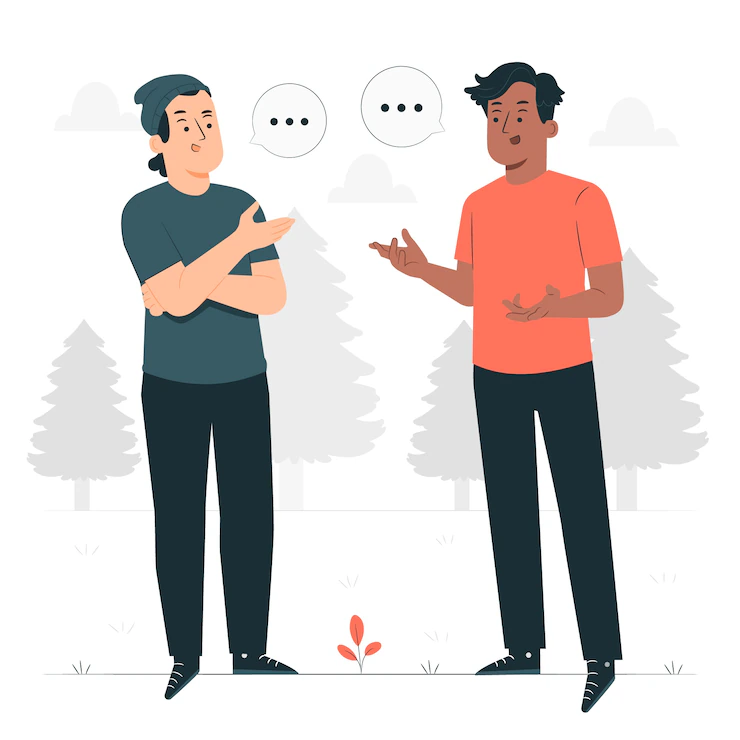Learn Quickly: 100 Short Conversational English Tips for Beginners
Contents
- Unlocking Fluency: Short English Conversations for Beginner Learners
- Basic English Conversation Tips for Beginners
- English Conversations for Everyday Situation
- English Conversations for Socialising
- English Conversations in Professional Settings
- Closing Remarks: Keep Talking, Keep Learning: Your Path to Fluent English Conversations Begins Here
- FAQs

Unlocking Fluency: Short English Conversations for Beginner Learners
Are you ready to unlock the power of conversation? Mastering English, or any other language for that matter, is not just about knowing grammar rules and expanding vocabulary! It's about gaining the confidence to communicate and connect with people from different walks of life with regular English conversation practice.
This blog is your ultimate guide to short English conversations, especially tailored for beginners. Our primary goal? To empower you! We aim to help you dive into real-life situations, navigate through them with ease, and come out speaking English more fluently than ever before.
So, gear up and embark on this exciting journey of language learning with us!
Basic English Conversation Tips for Beginners
One of the most important aspects for beginners is to focus on building a strong foundation. This is why we've put together some basic English conversation tips to help you get started:
Listen carefully: Pay close attention to what the other person is saying and try to understand their main message.
Be patient: Don't rush yourself or feel pressured to respond quickly. Take your time to process the information and formulate a response.
Use body language: Non-verbal communication, such as smiling and nodding, can encourage a positive conversation flow.
Ask questions: Showing interest in the other person's life and opinions is a great way to keep the conversation going.
Practice active listening: This means actively engaging with the speaker by repeating or summarizing what they have said to ensure understanding.
Consistent English conversation practice is vital in mastering English conversations. It helps reinforce your learning and turns understanding into second nature. By engaging in conversations regularly, you also improve your listening comprehension and response speed. The language gradually becomes more familiar, and your confidence grows.
Over time, daily English conversation practice can dramatically enhance your fluency. Remember, language mastery isn’t a sprint but a marathon. It’s about steady progress and persistence. So, make daily practice a habit and watch your English conversational skills soar!
English Conversations for Everyday Situation

Everyday English conversations are the foundation of our daily interactions. By mastering basic English conversational skills, we can easily communicate with others and build meaningful relationships. Let's look at an example to see some common ways to start everyday conversations:
In this video, we see that the Clapingo tutor begins by asking the student "How are you doing?" to which the student replies, "I am doing great."
This is one of the most common ways to start a conversation in English. You can ask someone how they're doing and then continue the conversation based on their answer. Likewise, if someone asks you this question, you can reply with "I am doing great" or "I'm doing okay" and ask the other person a follow-up question to get the conversation going.
If you are a complete beginner, practising such stock conversation starters can help you strengthen your conversation skills.
Here are some more examples of basic English conversations for everyday conversations.
Greeting - "Hello, my name is John. What's your name?"
Compliment - "I love your dress, where did you get it?"
Asking for Directions - "Excuse me, could you please tell me how to get to the nearest subway station?"
Making Plans - "I'm free next Saturday. Would you like to join me for a movie?"
Asking for Help - "Sorry to bother you, but could you help me understand this report?"
Expressing Opinions - "In my opinion, the book's storyline was more compelling than the movie version."
Job Inquiry - "I am interested in the job you posted. Could you tell me more about the responsibilities?"
Ordering Food - "I would like to order a Margherita pizza and a diet coke, please."
Making a Complaint - "Excuse me, there's a mistake in my bill. Could you correct it, please?"
Saying Goodbye - "It was nice meeting you. Hope to see you soon!"
English Conversations for Socialising
Socializing is a common and enjoyable activity that allows us to connect with others and build relationships. It involves engaging in conversations with others at a party, gathering, or when you are just hanging out. These conversations can also involve asking about someone's day, hobbies, or interests. Let's look at another example:
In this video, we can see a Clapingo tutor asking her student about her experience at a restaurant. Such conversations are common in socialising settings. Here are some sentence types that you can see in the video as the conversation progresses:
Asking Questions - "Have you ever tried lasagna?"
Sharing Experiences - "Recently, I had a really bad experience with red sauce pasta at a restaurant."
Saying Goodbye - "It was really nice talking to you!"
The video also shows that follow-up questions are a great way to keep the conversation going and make it an enjoyable experience for both speakers. You can also use this method to keep the conversation alive and interesting.
Here are some more examples of English conversations you may have while socializing:
"How is your day going so far?" - This is a great conversation starter to see how someone's day has been and show genuine interest in their well-being.
"Have you travelled anywhere interesting recently?" - Travel is a common topic of conversation, as it allows people to share their experiences and learn about new places.
"What do you enjoy doing in your free time?" - This question can lead to discovering common interests and potentially making plans together.
"Do you have any pets?" - Pets are a beloved topic of discussion for many people, allowing them to share stories and bond over their furry friends.
"What kind of music do you like?" - Music is another popular conversation topic, as it can reveal a lot about a person's personality and preferences.
"Do you have any upcoming events or plans?" - This can lead to discussing exciting future activities and potentially making plans together.
"What do you do for work/study?" - Work or study is a common topic of conversation, as it allows people to learn about each other's professions and daily lives.
"What do you like about this city/town?" - This question can spark discussions about local attractions, hidden gems, and what makes the place special.
"Do you have any favourite hobbies or sports?" - Hobbies and sports are great conversation topics as they can lead to learning new skills and potentially participating in activities together.
Further Resources on English Conversation Starters:
190+ Creative English Speaking Topics to Speak to Anyone | Clapingo
English Conversations in Professional Settings

Professional settings, especially job interviews, often follow a different set of English conversation topics compared to casual social settings. Mastering these conversations is crucial for making a good impression and showcasing your skills and qualifications.
To help you get started, here is a sample conversation:
In this video, the Clapingo tutor opens the conversation by asking the student "Is it a working Saturday for you?" The student replies, "Yes, I am taking online classes on the weekend." Such conversation starters are perfect for bringing up the topic of work and can help start a conversation revolving around professional settings. They then move on to talk about business ideas and how entrepreneurs come up with new, innovative products. This is a great way of engaging in casual or work-related conversations in a professional setting.
You can also take a look at these simple sentences that will come in handy during various professional interactions:
1. Greeting someone: "Good morning/afternoon/evening! How are you today?"
2. Introducing yourself: "Hi, my name is [Your Name]. I work as a [Your Profession]."
3. Asking someone's name: "May I ask your name?"
4. Giving your contact information: "Here's my business card/email address/phone number."
5. Requesting information: "Could you please provide me with more details about [topic]?"
6. Making small talk: "How was your weekend?"
7. Offering assistance: "Is there anything I can help you with?"
8. Scheduling a meeting: "When is a convenient time for us to meet?"
9. Accepting an invitation: "Thank you for inviting me. I would be delighted to attend."
10. Declining an invitation: "I appreciate the invitation, but unfortunately, I am unable to attend."
11. Requesting clarification: "I'm sorry, could you please repeat that? I didn't quite catch it."
12. Discussing goals and objectives: "What are our main objectives for this project/meeting?"
13. Presenting ideas or suggestions: "I have an idea/suggestion that might be worth considering."
14. Asking for feedback: "What do you think about my proposal/presentation?"
15. Agreeing with someone's opinion: "I completely agree with you."
Applying What You've Learned
Whether in personal or professional settings, effective communication is key to success. Using the above phrases in appropriate contexts can enhance your communication skills and help you convey your ideas more clearly. It's important to keep in mind that using these phrases alone won't make you a better communicator - it's also essential to listen actively, use nonverbal cues effectively, and adapt your message to different audiences.
By consistently practising English conversation and refining your communication skills, you can become a more confident and persuasive speaker, leading to stronger relationships and better outcomes in all aspects of your life. So keep learning, keep practising, and never stop striving for improvement!
Closing Remarks: Keep Talking, Keep Learning: Your Path to Fluent English Conversations Begins Here
Practicing English conversations is crucial for linguistic fluency and confidence. It helps in understanding the nuances of the language, including idioms, phrases, and cultural implications. Regular interaction in English bolsters listening and responding abilities, leading to effective and natural communication. Moreover, it bridges language barriers, fostering global connections and collaborations.
As we wrap up, remember that the conversations covered in this blog are not endpoints but starting points. Use them as a launchpad to dive deeper into the English language. Explore new phrases, idioms, and stylistic nuances as you engage in different English conversation dialogues. These interactions will not only enrich your vocabulary but also boost your confidence and fluency. Keep practising, and keep exploring!
Clapingo is here to support you on your journey to fluent conversations. With our interactive platform, you can practice real-life English conversations with native speakers and receive personalized feedback to enhance your skills further. Start your journey today and see how far it takes you! So don't wait any longer, come join us at Clapingo and start improving your communication skills today! Remember, the key to fluent conversations is practice, so keep talking and never stop learning!
FAQs
How to start a conversation in English?
Start with a simple greeting. Ask open-ended questions about the other person to keep the conversation going. Use appropriate body language and gestures while speaking. Focus on using small words and keep your sentences short, as this will help you remember what to say in English conversations. Listen carefully to the other person's response and use follow-up questions to show genuine interest.
What are some easy ways to introduce myself?
Introducing yourself can be as simple as introducing your name, where you’re from, and what you do. You can also talk about your family or hobbies to give the other person a better idea of who you are. Make sure to maintain eye contact and use a friendly tone when speaking.
How to make small talk in English through conversations or dialogues?
Making small talk in English through conversations or dialogues can be as simple as mentioning the weather, asking about how the day is going, or talking about recent news. Try to use open-ended questions that will lead to more detailed conversations.
Comments
Your comment has been submitted